(完整版)新概念英语第二册练习Lesson10.
- 格式:doc
- 大小:24.01 KB
- 文档页数:7
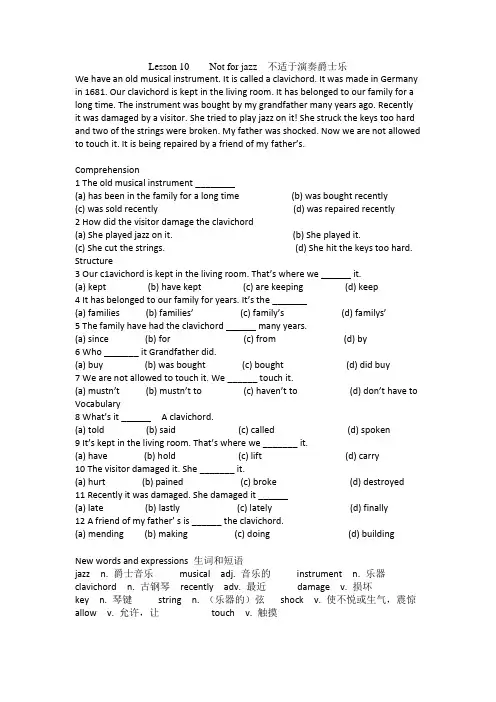
Lesson 10 Not for jazz 不适于演奏爵士乐We have an old musical instrument. It is called a clavichord. It was made in Germany in 1681. Our clavichord is kept in the living room. It has belonged to our family for a long time. The instrument was bought by my grandfather many years ago. Recently it was damaged by a visitor. She tried to play jazz on it! She struck the keys too hard and two of the strings were broken. My father was shocked. Now we are not allowed to touch it. It is being repaired by a friend of my father’s.Comprehension1 The old musical instrument ________(a) has been in the family for a long time (b) was bought recently(c) was sold recently (d) was repaired recently2 How did the visitor damage the clavichord(a) She played jazz on it. (b) She played it.(c) She cut the strings. (d) She hit the keys too hard. Structure3 Our c1avichord is kept in the living room. That’s where we ______ it.(a) kept (b) have kept (c) are keeping (d) keep4 It has belonged to our family for years. It’s the _______(a) families (b) families’(c) family’s (d) familys’5 The family have had the clavichord ______ many years.(a) since (b) for (c) from (d) by6 Who _______ it Grandfather did.(a) buy (b) was bought (c) bought (d) did buy7 We are not allowed to touch it. We ______ touch it.(a) mustn’t (b) mustn’t to (c) haven’t to (d) don’t have to Vocabulary8 What’s it ______ A clavichord.(a) told (b) said (c) called (d) spoken9 It’s kept in the living room. That’s where we _______ it.(a) have (b) hold (c) lift (d) carry10 The visitor damaged it. She _______ it.(a) hurt (b) pained (c) broke (d) destroyed11 Recently it was damaged. She damaged it ______(a) late (b) lastly (c) lately (d) finally12 A friend of my father’ s is ______ the clavichord.(a) mending (b) making (c) doing (d) buildingNew words and expressions 生词和短语jazz n. 爵士音乐musical adj. 音乐的instrument n. 乐器clavichord n. 古钢琴recently adv. 最近damage v. 损坏key n. 琴键string n. (乐器的)弦shock v. 使不悦或生气,震惊allow v. 允许,让touch v. 触摸。
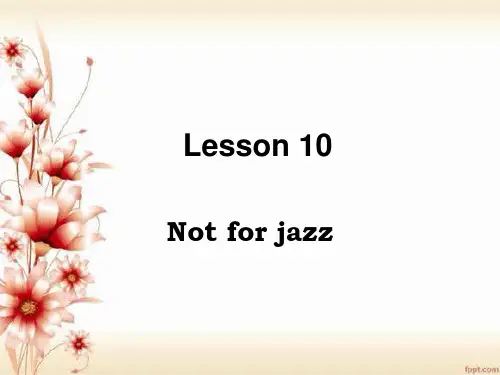
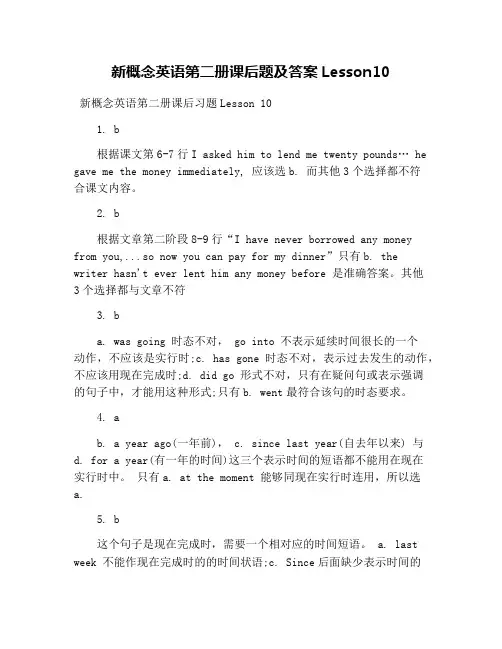
新概念英语第二册课后题及答案Lesson10新概念英语第二册课后习题Lesson 101. b根据课文第6-7行I asked him to lend me twenty pounds… he gave me the money immediately, 应该选b. 而其他3个选择都不符合课文内容。
2. b根据文章第二阶段8-9行“I have never borrowed any money from you,...so now you can pay for my dinner”只有b. thewriter hasn't ever lent him any money before 是准确答案。
其他3个选择都与文章不符3. ba. was going 时态不对, go into 不表示延续时间很长的一个动作,不应该是实行时;c. has gone 时态不对,表示过去发生的动作,不应该用现在完成时;d. did go 形式不对,只有在疑问句或表示强调的句子中,才能用这种形式;只有b. went最符合该句的时态要求。
4. ab. a year ago(一年前),c. since last year(自去年以来) 与d. for a year(有一年的时间)这三个表示时间的短语都不能用在现在实行时中。
只有a. at the moment 能够同现在实行时连用,所以选a.5. b这个句子是现在完成时,需要一个相对应的时间短语。
a. last week 不能作现在完成时的的时间状语;c. Since后面缺少表示时间的名词;d. A week ago 也不能做现在完成时的时间状语;只有b. Uptill now(到当前为止)能同现在完成时连用,所以选b.6. c问“多少钱”需要用表示不可数的疑问词来提问。
a. how many (多少)是对可数的事物或人提问的;b. how不能对名词(钱)提问,只能问方式或状态d. how few也不能对钱提问,只能修饰可数名词;只有c. how much 是针对不可数的事物提问的,问“多少钱”,只能用how much提问,所以选c.7. ca. want to 不合乎题目意思;b. want语法不对,也不符合题目意思;d. you want to 语序错误;只有c. want you to 最合乎语法和题目意思。
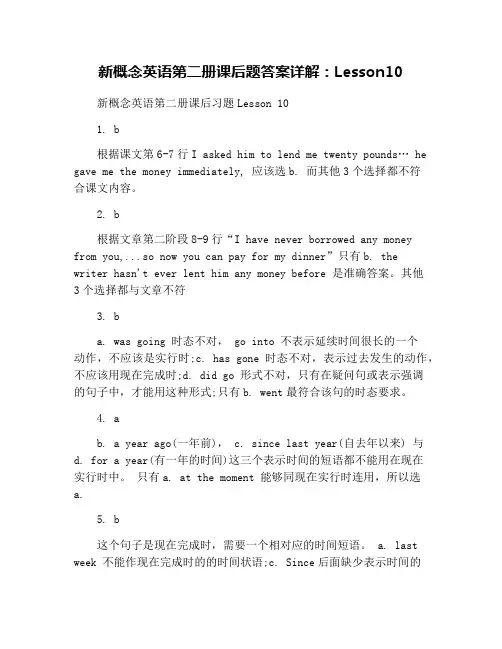
新概念英语第二册课后题答案详解:Lesson10新概念英语第二册课后习题Lesson 101. b根据课文第6-7行I asked him to lend me twenty pounds… he gave me the money immediately, 应该选b. 而其他3个选择都不符合课文内容。
2. b根据文章第二阶段8-9行“I have never borrowed any money from you,...so now you can pay for my dinner”只有b. thewriter hasn't ever lent him any money before 是准确答案。
其他3个选择都与文章不符3. ba. was going 时态不对, go into 不表示延续时间很长的一个动作,不应该是实行时;c. has gone 时态不对,表示过去发生的动作,不应该用现在完成时;d. did go 形式不对,只有在疑问句或表示强调的句子中,才能用这种形式;只有b. went最符合该句的时态要求。
4. ab. a year ago(一年前),c. since last year(自去年以来) 与d. for a year(有一年的时间)这三个表示时间的短语都不能用在现在实行时中。
只有a. at the moment 能够同现在实行时连用,所以选a.5. b这个句子是现在完成时,需要一个相对应的时间短语。
a. last week 不能作现在完成时的的时间状语;c. Since后面缺少表示时间的名词;d. A week ago 也不能做现在完成时的时间状语;只有b. Uptill now(到当前为止)能同现在完成时连用,所以选b.6. c问“多少钱”需要用表示不可数的疑问词来提问。
a. how many (多少)是对可数的事物或人提问的;b. how不能对名词(钱)提问,只能问方式或状态d. how few也不能对钱提问,只能修饰可数名词;只有c. how much 是针对不可数的事物提问的,问“多少钱”,只能用how much提问,所以选c.7. ca. want to 不合乎题目意思;b. want语法不对,也不符合题目意思;d. you want to 语序错误;只有c. want you to 最合乎语法和题目意思。
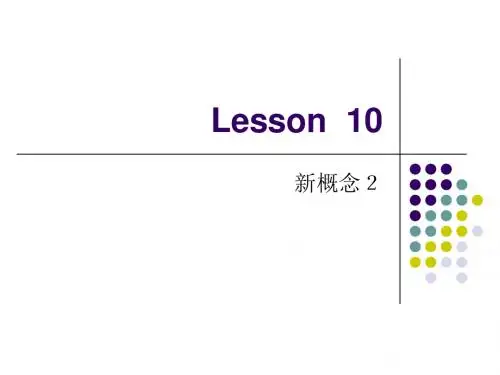
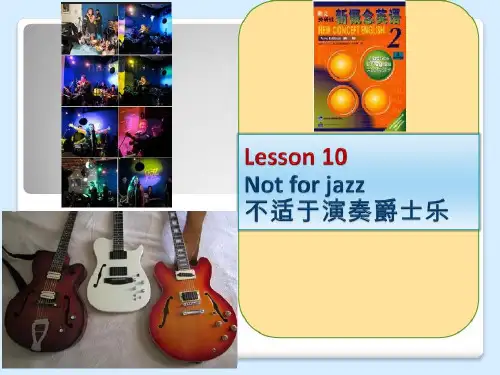
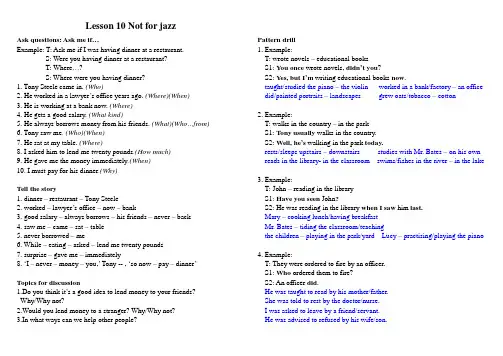
Lesson 10 Not for jazzAsk questions: Ask me if…Example: T: Ask me if I was having dinner at a restaurant.S: Were you having dinner at a restaurant?T: Where…?S: Where were you having dinner?1. Tony Steele came in. (Who)2. He worked in a lawyer’s office years ago. (Where)(When)3. He is working at a bank now. (Where)4. He gets a good salary. (What kind)5. He always borrows money from his friends. (What)(Who…from)6. Tony saw me. (Who)(When)7. He sat at my table. (Where)8. I asked him to lend me twenty pounds.(How much)9. He gave me the money immediately.(When)10. I must pay for his dinner.(Why)Tell the story1. dinner – restaurant – Tony Steele2. worked – lawyer’s office – now – bank3. good salary – always borrows – his friends – never – back4. saw me – came – sat – table5. never borrowed – me6. While – eating – asked – lend me twenty pounds7. surprise – gave me – immediately8. ‘I – never – money – you,’ Tony -- , ‘so now – pay – dinner’Topics for discussion1.Do you think it’s a good idea to lend money to your friends? Why/Why not?2.Would you lend money to a stranger? Why/Why not?3.In what ways can we help other people? Pattern drill1. Example:T: wrote novels – educational booksS1: You once wrote novels, didn’t you?S2: Yes, but I’m writing educational books now.taught/studied the piano – the violin worked in a bank/factory – an office did/painted portraits – landscapes grew oats/tobacco – cotton2. Example:T: walks in the country – in the parkS1: Tony usually walks in the country.S2: Well, he’s walking in the park today.rests/sleeps upstairs – downstairs studies with Mr. Bates – on his own reads in the library- in the classroom swims/fishes in the river – in the lake 3. Example:T: John – reading in the libraryS1: Have you seen John?S2: He was reading in the library when I saw him last.Mary – cooking lunch/having breakfastMr. Bates – tiding the classroom/teachingthe children – playing in the park/yard Lucy – practising/playing the piano 4. Example:T: They were ordered to fire by an officer.S1: Who ordered them to fire?S2: An officer did.He was taught to read by his mother/father.She was told to rest by the doctor/nurse.I was asked to leave by a friend/servant.He was advised to refused by his wife/son.Lesson 10 Not for jazzAsk questions: Ask me if…Example: T: Ask me if I was having dinner at a restaurant.S: Were you having dinner at a restaurant?T: Where…?S: Where were you having dinner?1. Tony Steele came in. (Who)2. He worked in a lawyer’s office years ago. (Where)(When)3. He is working at a bank now. (Where)4. He gets a good salary. (What kind)5. He always borrows money from his friends. (What)(Who…from)6. Tony saw me. (Who)(When)7. He sat at my table. (Where)8. I asked him to lend me twenty pounds.(How much)9. He gave me the money immediately.(When)10. I must pay for his dinner.(Why)Tell the story1. dinner – restaurant – Tony Steele2. worked – lawyer’s office – now – bank3. good salary – always borrows – his friends – never – back4. saw me – came – sat – table5. never borrowed – me6. While – eating – asked – lend me twenty pounds7. surprise – gave me – immediately8. ‘I – never – money – you,’ Tony --, ‘so now – pay – dinner’Topics for discussion1.Do you think it’s a good idea to lend money to your friends?Why/Why not?2.Would you lend money to a stranger? Why/Why not?3.In what ways can we help other people?Comprehension questions1. Where were you having dinner?2. Who came in?3. Did he once work in a lawyer’s office?4. How long ago was that?5. Where is he working now?6. Is he paid a good salary?7. What does he always do?8. Do you think he needs to borrow money?9. Does he ever pay it back?10. What did Tony do when he saw you?11. Have you ever lent him any money?12. Did you have dinner together?13. What did you ask him during dinner?14. What did he give you immediately?15. Were you surprised?16. Did he pay for the dinner?Pattern drill1. Example:T: wrote novels – educational booksS1: You once wrote novels, didn’t you?S2: Yes, but I’m writing educational books now.taught/studied the piano – the violin worked in a bank/factory – an office did/painted portraits – landscapes grew oats/tobacco – cotton2. Example:T: walks in the country – in the parkS1: Tony usually walks in the country.S2: Well, he’s walking in the park today.rests/sleeps upstairs – downstairs studies with Mr. Bates – on his own reads in the library- in the classroom swims/fishes in the river – in the lake 3. Example:T: John – reading in the libraryS1: Have you seen John?S2: He was reading in the library when I saw him last.Mary – cooking lunch/having breakfastMr. Bates – tiding the classroom/teachingthe children – playing in the park/yard Lucy – practising/playing the piano 4. Example:T: They were ordered to fire by an officer.S1: Who ordered them to fire?S2: An officer did.He was taught to read by his mother/father.She was told to rest by the doctor/nurse.I was asked to leave by a friend/servant.He was advised to refused by his wife/son.。
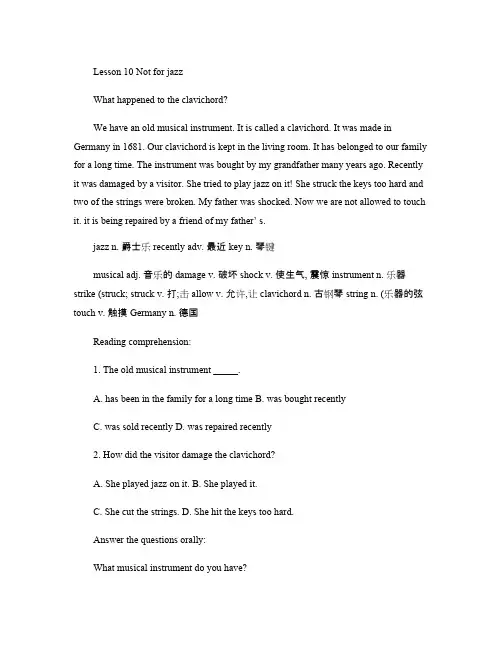
Lesson 10 Not for jazzWhat happened to the clavichord?We have an old musical instrument. It is called a clavichord. It was made in Germany in 1681. Our clavichord is kept in the living room. It has belonged to our family for a long time. The instrument was bought by my grandfather many years ago. Recently it was damaged by a visitor. She tried to play jazz on it! She struck the keys too hard and two of the strings were broken. My father was shocked. Now we are not allowed to touch it. it is being repaired by a friend of my father’ s.jazz n. 爵士乐 recently adv. 最近 key n. 琴键musical adj. 音乐的 damage v. 破坏 shock v. 使生气, 震惊 instrument n. 乐器strike (struck; struck v. 打;击 allow v. 允许,让 clavichord n. 古钢琴 string n. (乐器的弦touch v. 触摸 Germany n. 德国Reading comprehension:1. The old musical instrument _____.A. has been in the family for a long timeB. was bought recentlyC. was sold recentlyD. was repaired recently2. How did the visitor damage the clavichord?A. She played jazz on it.B. She played it.C. She cut the strings.D. She hit the keys too hard.Answer the questions orally:What musical instrument do you have?Was it old or new?What happened to it recently?How was it damaged?Is it being repaired now?Structure & vocabulary:1. Our clavichord is kept in the living-room. That’ s where we _____ it.A. keptB. have keptC. are keepingD. keep2. It has belonged to our family. It’ s the _____.A. familiesB. families’C. family’ sD. familys’3. The family have had the clavichord _____ many years.A. sinceB. forC. fromD. by4. Who _____ it? Grandfather did.A. buyB. was boughtC. boughtD. did buy5. We are not allowed to touch it. We _____ touch it.A. mustn’ tB. mustn’ t toC. haven’ t toD. don’ t have to6. What ’ s it _____? A clavichord.A. toldB. saidC. calledD. spoken7. It ’ s kept in the living-room. That’ s where we _____ it.A. haveB. holdC. liftD. carry8. The visitor damaged it. She _____ it.A. hurtB. painedC. brokeD. destroyed9. Recently it was damaged. She damaged it _____.A. lateB. lastlyC. latelyD. finally10. A friend of my father’ s is _____ the clavichord.A. mendingB. makingC. doingD. buildingKey structures:a--Who built the bridge? --When was this bridge built?--Prisoners of war built this bridge in 1942.This bridge was built by prisoners of war in 1942.b Read these pairs of sentences carefully. The first sentence in each pair tells us about a person. The second tells us about a thing.Workmen are building a new road outside my horse.A new road is being built outside my house.The newsagent delivers our papers every morning.Our papers are delivered every morning.The postman delivered a letter this morning.A letter was delivered this morning.c Read these sentences:The police arrested the thief. The thief was arrested (by the police.He gave me a present. I was given a present.The headmaster has punished the boy. The boy has been punished (by the headmaster.ExercisesA. Answer these questions on the passage. Write a complete answer to each question:1. What is our old musical instrument called?2. Where was it made?3. Where is it kept?4. When was it bought?5. When was it damaged?6. How many strings were broken?7. How did my father feel about this?8. What aren’ t we allowed to do?9. What is being done to the clavichord?B. change the form of the phrases in italics. Do not refer to the passage until you finish the exercise: We call it a clavichord.__________________________________________Someone made it in Germany in1681.__________________________________________ We keep our clavichord in the living room. __________________________________________ My grandfather bought the instrument many years ago. ___________________________________ Recently a visitor damaged it. __________________________________________She struck the keys too hard and broke two of the strings._________________________________ This shocked my father.__________________________________________Now he does not allow us to touch it.__________________________________________ A friend of my father’ s is repairing it. __________________________________________ Language points:A. be made inIt was made in Germany.be made ofThe tea pot is made of silver.be made fromBread is made from flour.be made byThis cake was made by my sister.Supply the correct words:1. Is your watch made ______ gold?2. These knives were made ______ Sheffield.3. This cake was made ______ sugar, flour, butter and eggs.4. The model plane was made ______ a group of students.B. a friend of my father’ s 双重所有格He is one of my father’ s friends. He is a friend of my father’ sTom lent me one of his books. Tom lent me a book of his.He is one of my friends. He is a friend _______ ________.Change the form of the phrases in italics:1. He borrowed one of my records. ____________________________________2. She showed me one of John’ s pictures.____________________________________3. It was one of her ideas. ____________________________________4. One of you letters was found on my desk.____________________________________5. Some of their friends came to see me.____________________________________Exercises:A . Rewrite the sentences and change the active voice into passive voice:1. These workmen are repairing my house.2. The police picked up the boy in the forest.3. The boy sends the newspaper to me every morning.4. They will take care of your grandmother.5. Mary wrote three books last year.6. She is washing your clothes.7. They are painting the wall.8. I am telling him how to be a good student.B. Translating:1. 这幢楼叫做“联谊大厦” (Union building。

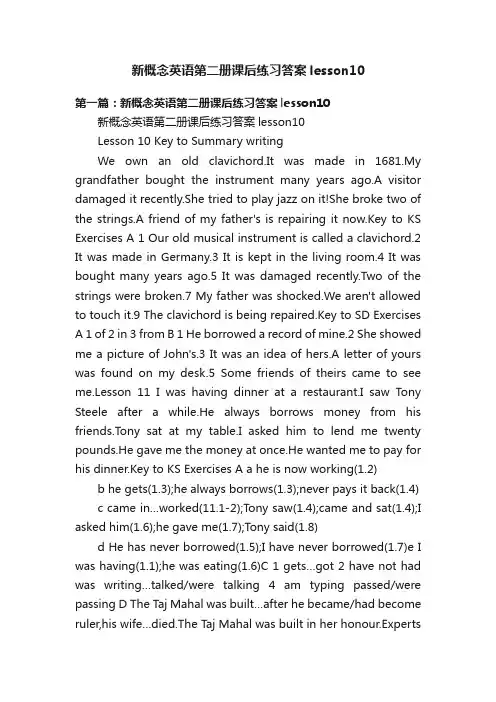
新概念英语第二册课后练习答案lesson10第一篇:新概念英语第二册课后练习答案lesson10新概念英语第二册课后练习答案lesson10Lesson 10 Key to Summary writingWe own an old clavichord.It was made in 1681.My grandfather bought the instrument many years ago.A visitor damaged it recently.She tried to play jazz on it!She broke two of the strings.A friend of my father's is repairing it now.Key to KS Exercises A 1 Our old musical instrument is called a clavichord.2 It was made in Germany.3 It is kept in the living room.4 It was bought many years ago.5 It was damaged recently.Two of the strings were broken.7 My father was shocked.We aren't allowed to touch it.9 The clavichord is being repaired.Key to SD Exercises A 1 of 2 in 3 from B 1 He borrowed a record of mine.2 She showed me a picture of John's.3 It was an idea of hers.A letter of yours was found on my desk.5 Some friends of theirs came to see me.Lesson 11 I was having dinner at a restaurant.I saw Tony Steele after a while.He always borrows money from his friends.Tony sat at my table.I asked him to lend me twenty pounds.He gave me the money at once.He wanted me to pay for his dinner.Key to KS Exercises A a he is now working(1.2)b he gets(1.3);he always borrows(1.3);never pays it back(1.4)c came in…worked(11.1-2);T ony saw(1.4);came and sat(1.4);I asked him(1.6);he gave me(1.7);Tony said(1.8)d He has never borrowed(1.5);I have never borrowed(1.7)e I was having(1.1);he was eating(1.6)C 1 gets…got 2 have not had was writing…talked/were ta lking 4 am typing passed/were passing D The Taj Mahal was built…after he became/had become ruler,his wife…died.The Taj Mahal was built in her honour.Expertswere called in…The Taj Mahal, which was begun in 1632 and(was)completed in 1654, cost a fortune…it has been visited by… Key to SD Exercises a A The officer ordered the men to fire at the enemy.2 He wants his wife to wear this dress.3 She wants us to explain it.I cannot allow him to enter the room.B(sample sentences)He asked me to help him.We preferred her to stay at home.3 He taught me to speak English.My mother wished me to collect the laundry.5 Do you want her to visit you? b salary lent…salary/wages 3 borrowed 4 wages 5 wages 选择题1.a根据课文第3行It has belonged to our family for a long time.只有a.has been in the family for a long time 是正确的,其他3个选择都不符合课文内容。
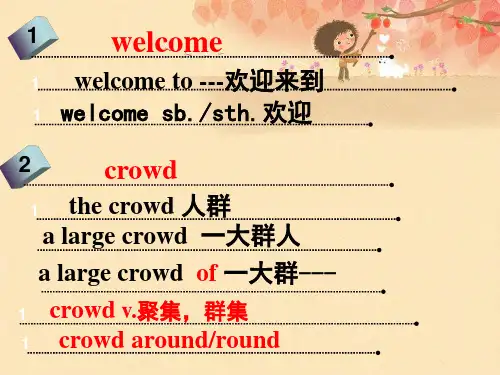
Lesson 10 Not for jazzWhat happened to the clavichord?We have an old musical instrument. It is called a clavichord. It was made in Germany in 1681. Our clavichord is kept in the living room. It has belonged to our family for a long time. The instrument was bought by my grandfather many years ago. Recently it was damaged by a visitor. She tried to play jazz on it! She struck the keys too hard and two of the strings were broken. My father was shocked. Now we are not allowed to touch it. it is being repaired by a friend of my father’ s.jazz n. 爵士乐 recently adv. 最近 key n. 琴键musical adj. 音乐的 damage v. 破坏 shock v. 使生气, 震惊 instrument n. 乐器strike (struck; struck v. 打;击 allow v. 允许,让 clavichord n. 古钢琴 string n. (乐器的弦touch v. 触摸 Germany n. 德国Reading comprehension:1. The old musical instrument _____.A. has been in the family for a long timeB. was bought recentlyC. was sold recentlyD. was repaired recently2. How did the visitor damage the clavichord?A. She played jazz on it.B. She played it.C. She cut the strings.D. She hit the keys too hard.Answer the questions orally:What musical instrument do you have?Was it old or new?What happened to it recently?How was it damaged?Is it being repaired now?Structure & vocabulary:1. Our clavichord is kept in the living-room. That’ s where we _____ it.A. keptB. have keptC. are keepingD. keep2. It has belonged to our family. It’ s the _____.A. familiesB. families’C. family’ sD. familys’3. The family have had the clavichord _____ many years.A. sinceB. forC. fromD. by4. Who _____ it? Grandfather did.A. buyB. was boughtC. boughtD. did buy5. We are not allowed to touch it. We _____ touch it.A. mustn’ tB. mustn’ t toC. haven’ t toD. don’ t have to6. What ’ s it _____? A clavichord.A. toldB. saidC. calledD. spoken7. It ’ s kept in the living-room. That’ s where we _____ it.A. haveB. holdC. liftD. carry8. The visitor damaged it. She _____ it.A. hurtB. painedC. brokeD. destroyed9. Recently it was damaged. She damaged it _____.A. lateB. lastlyC. latelyD. finally10. A friend of my father’ s is _____ the clavichord.A. mendingB. makingC. doingD. buildingKey structures:a--Who built the bridge? --When was this bridge built?--Prisoners of war built this bridge in 1942.This bridge was built by prisoners of war in 1942.b Read these pairs of sentences carefully. The first sentence in each pair tells us about a person. The second tells us about a thing.Workmen are building a new road outside my horse.A new road is being built outside my house.The newsagent delivers our papers every morning.Our papers are delivered every morning.The postman delivered a letter this morning.A letter was delivered this morning.c Read these sentences:The police arrested the thief. The thief was arrested (by the police.He gave me a present. I was given a present.The headmaster has punished the boy. The boy has been punished (by the headmaster.ExercisesA. Answer these questions on the passage. Write a complete answer to each question:1. What is our old musical instrument called?2. Where was it made?3. Where is it kept?4. When was it bought?5. When was it damaged?6. How many strings were broken?7. How did my father feel about this?8. What aren’ t we allowed to do?9. What is being done to the clavichord?B. change the form of the phrases in italics. Do not refer to the passage until you finish the exercise: We call it a clavichord.__________________________________________Someone made it in Germany in1681.__________________________________________ We keep our clavichord in the living room. __________________________________________ My grandfather bought the instrument many years ago. ___________________________________ Recently a visitor damaged it. __________________________________________She struck the keys too hard and broke two of the strings._________________________________ This shocked my father.__________________________________________Now he does not allow us to touch it.__________________________________________ A friend of my father’ s is repairing it. __________________________________________ Language points:A. be made inIt was made in Germany.be made ofThe tea pot is made of silver.be made fromBread is made from flour.be made byThis cake was made by my sister.Supply the correct words:1. Is your watch made ______ gold?2. These knives were made ______ Sheffield.3. This cake was made ______ sugar, flour, butter and eggs.4. The model plane was made ______ a group of students.B. a friend of my father’ s 双重所有格He is on e of my father’ s friends. He is a friend of my father’ sTom lent me one of his books. Tom lent me a book of his.He is one of my friends. He is a friend _______ ________.Change the form of the phrases in italics:1. He borrowed one of my records. ____________________________________2. She showed me one of John’ s pictures.____________________________________3. It was one of her ideas. ____________________________________4. One of you letters was found on my desk.____________________________________5. Some of their friends came to see me.____________________________________Exercises:A . Rewrite the sentences and change the active voice into passive voice:1. These workmen are repairing my house.2. The police picked up the boy in the forest.3. The boy sends the newspaper to me every morning.4. They will take care of your grandmother.5. Mary wrote three books last year.6. She is washing your clothes.7. They are painting the wall.8. I am telling him how to be a good student.B. Translating:1. 这幢楼叫做“联谊大厦” (Union building。
Lesson10一、根据句意和首字母提示写出所缺的单词或短语。
1. She prefers pop music and j____ while her sister likes classical music.2. R____ I have received three gifts from him.3. The old house was d____ by a heavy rain last night.4. Don't t____ the hot button or you will get burnt.5. My mother is a very tidy person and she doesn't a____ us to drop litter everywhere.6. She was totally s____ at the news of his death.7. The black and white k____ on the piano keyboard are beautiful for her.8. Which m____ i____ is your favourite?二、将下列句子改为被动语态。
1. A car knocked him down at the corner of the street.________________________________________________2. I felt sorry when people laughed at me for my disability.________________________________________________3. My teacher gave me a lot of help with English.________________________________________________4. His boss made him work from dawn until dark.________________________________________________5. I saw the boy fishing by the river.________________________________________________三、用所给词的正确形式填空。
)17. The books may __________ for two weeks.A. be keptB. be borrowedC. kee p )18. The teacher made him ___________ his homework.A. to doB. doB. be borrowedD. borrowC. didD.done、单项选择:D. has not bee n writte n被动语态练习A. speaksB. are sp oke nC. is sp eak ingD. is sp oke n()2. This En glish songby the girls after class.A. often singsB. ofte n sangC. is ofte n sangD. is ofte n sung()3. This kind of carin Japan.A, makesB. madeC. is mak ingD. is made()4. New compu tersall over the world.A. is usedB. are usingC. are usedD. have used()5. Our room mustclea n.A. keepB. be keptC. to be keptD. to keep()6. A new houseat the corner of the roac1.A. is buildi ngB. is being builtC. been builtD. be buildi ng()7. Doctorsin every part of the world.A.needB. are n eedi ngC. are n eededD. will n eed()8. Japan esein every coun try.A. is not sp oke nB. are sp oke nC. is sp eak ingD. is not sp eak ing()9. These papersyet.()1. En glish in Can ada. A. have not writte nB. have not bee n writte nC. has not writte n)10. The sports meet ingA. did n'tB. won'tbe held un til next week. C. is n'tD. does n't)11. ______ the watch bee n rep aired yet? I badly n eed it.A. DoesB. HasC. IsD. Are)12.A. Willthese desks be n eeded? B. AreC. HasD. Do)13. Why _______ to talk about it yesterday?A. did n't a meet ing hold C. was n't held a meeti ng)14. Who was the book ___________ ?A. writeB. wroteB. was n't a meet ing held D. a meet ing was n't heldC. writtenD. writte n by)15. Where _ these boxes made? A. wasB. wereC. isD. am)16. The flowers ________ often.A. must be waterB. must be wateredC. must wateredD. must water)19. The boy ________ streets without paying in the old days.A. was made to clea nB. made clea nC. made to clea n)20. These childre n _________ dance.A. were see n toB. were see n forC. were see n)21. Great changes ___________ in the p ast ten years in China.A. took p laceB. have take n p laceC. were tak ing p laceD. had take n p lace)22. Great cha nges __________ in our country duri ng the p ast 20 years.A. have happenedB. happenedC. have been happenedD. were happened)23. Please p ass me ano ther cup. This one ____________ .A. is broke nB. is break ingC. brokeD. broken)24. The story books by the writer in the 1960s.A. are writte nB. were writte nC. are writi ngD. were writ ing)25. What time the door every day?A. does; closedB. does; closeC. is; closedD. /; close)26. The apple very sweet.A. is tastedB. tasteC. tastesD. are tasti ng )27. Youmore beautiful in the light blue shirt.A. seeB. watchC. lookD. look at)28..How dirty the tables are! They n eed .A. to clea nB. clea nC. clea ningD. clea ned )29. The broken bike here by Mr. Smith.A. can mendB. can men dedC. can be mendD. can be men ded (( ( ( (()30. The old bridge in my hometown ______________ n ext mon th. A. is going to be rebuilt B. will rebuilt‘C. are going to be rebuiltD. are going to rebuilt)31. The p lay _______ at the theatre next Sun day. A. is going to be show n B. will show n C. will show )32. Now these magazines _____________ i n the library for a long time. A. have kept B. are kee ping C. have bee n kee ping D. have bee n kept )33. Tea in the south ofChina. A. grows D. is show n )34. Wet clothes are ofte n A. hang )35. The river smells terrible. People must __ A. be stopped to throw C. stop to throw )36. Old people must be looked after well and A. speak to B. spoken )37. Old peo pie must _________ . A. look after well C. looked well after B. is grow nC. were grow n up n ear a fire in rainy weather.B. han gedC. hanging _ dirty things into it.B. be stopped from throw ing D.stop from throw ing p olitely. C. speakD. will grow D.hung D.spoken toB. be looked well after D. be looked after wellD. was made clea nD. saw to)38. Jane _______ to sing us an America n song last Saturday.A. calledB. was askedC. told)39. I _____ five minu tes to decide whether I should go or not.A. gaveB. was givi ngC. had give n)40. Really ? ________________ Jim _______________ the monitor?A. Did, choose to beB. Was, chose n to beC. Has, chose n to be二、将下列句子变为被动语态:1. They clea n the room every day.2. He lost two books yesterday. D. was said D. was give nD. Were, chose n to be3. My mother washed my school uniform last Sun day.4. They water young trees every day.5. Uncle Wang men ded twenty bikes last week.6. People would n ever forget the accide nt.7. He is going to buy his daughter three books tomorrow.8. She has turned on the compu ter already.9. They have held a charity show.10. You should in vite more people to come.11. They can sing an En glish song.12. People are buildi ng a new bridge now.13. The boss made the workers work nine hours a day.14. I ofte n see the old man feed the birds.15. We can hear the baby laugh ing at the mome nt.11 —15: 21--25: BABDB BAABC 16—20: 26--30:BABAA CCCDA31--35: ADBDB36—40:DDBDB二、改为被动语态1. The room is clea ned (by them) every day.2. Two books were lost (by him) yesterday.3. My school uniform was washed by my mother last Sun day.4. Young trees are watered (by them) every day.5. Twenty bikes were men ded by Un cle Wang last week.6. The accide nt would n ever be forgotte n (by peop le).7. His daughter is going to be bought three books (by him) tomorrow. Three books are going to be bought for his daughter (by him) tomorrow,8. The compu ter has bee n turned on (by her) already. 9. A charity show has bee n held by them.10. More people should be in vited to come (by you). 11. An En glish song can be sung (by them). 12. A new bridge is being built (by people) now.13. The workers were made to work nine hours a day by the boss. 14. The old man is ofte n see n to feed the birds.15. The baby can be held laughi ng (by us) at the mome nt.参考答案: 一、单项选择1 — 5: DDDCB 6—10: BCABB。
Lesson 10 Not for jazzWhat happened to the clavichord?We have an old musical instrument. It is called a clavichord. It was made in Germany in 1681. Our clavichord is kept in the living room. It has belonged to our family for a long time. The instrument was bought by my grandfather many years ago. Recently it was damaged by a visitor. She tried to play jazz on it! She struck the keys too hard and two of the strings were broken. My father was shocked. Now we are not allowed to touch it. it is being repaired by a friend of my father’ s.jazz n. 爵士乐 recently adv. 最近 key n. 琴键musical adj. 音乐的 damage v. 破坏 shock v. 使生气, 震惊 instrument n. 乐器strike (struck; struck v. 打;击 allow v. 允许,让 clavichord n. 古钢琴 string n. (乐器的弦touch v. 触摸 Germany n. 德国Reading comprehension:1. The old musical instrument _____.A. has been in the family for a long timeB. was bought recentlyC. was sold recentlyD. was repaired recently2. How did the visitor damage the clavichord?A. She played jazz on it.B. She played it.C. She cut the strings.D. She hit the keys too hard.Answer the questions orally:What musical instrument do you have?Was it old or new?What happened to it recently?How was it damaged?Is it being repaired now?Structure & vocabulary:1. Our clavichord is kept in the living-room. That’ s where we _____ it.A. keptB. have keptC. are keepingD. keep2. It has belonged to our family. It’ s the _____.A. familiesB. families’C. family’ sD. familys’3. The family have had the clavichord _____ many years.A. sinceB. forC. fromD. by4. Who _____ it? Grandfather did.A. buyB. was boughtC. boughtD. did buy5. We are not allowed to touch it. We _____ touch it.A. mustn’ tB. mustn’ t toC. haven’ t toD. don’ t have to6. What ’ s it _____? A clavichord.A. toldB. saidC. calledD. spoken7. It ’ s kept in the living-room. That’ s where we _____ it.A. haveB. holdC. liftD. carry8. The visitor damaged it. She _____ it.A. hurtB. painedC. brokeD. destroyed9. Recently it was damaged. She damaged it _____.A. lateB. lastlyC. latelyD. finally10. A friend of my father’ s is _____ the clavichord.A. mendingB. makingC. doingD. buildingKey structures:a--Who built the bridge? --When was this bridge built?--Prisoners of war built this bridge in 1942.This bridge was built by prisoners of war in 1942.b Read these pairs of sentences carefully. The first sentence in each pair tells us about a person. The second tells us about a thing.Workmen are building a new road outside my horse.A new road is being built outside my house.The newsagent delivers our papers every morning.Our papers are delivered every morning.The postman delivered a letter this morning.A letter was delivered this morning.c Read these sentences:The police arrested the thief. The thief was arrested (by the police.He gave me a present. I was given a present.The headmaster has punished the boy. The boy has been punished (by the headmaster.ExercisesA. Answer these questions on the passage. Write a complete answer to each question:1. What is our old musical instrument called?2. Where was it made?3. Where is it kept?4. When was it bought?5. When was it damaged?6. How many strings were broken?7. How did my father feel about this?8. What aren’ t we allowed to do?9. What is being done to the clavichord?B. change the form of the phrases in italics. Do not refer to the passage until you finish the exercise: We call it a clavichord.__________________________________________Someone made it in Germany in1681.__________________________________________ We keep our clavichord in the living room. __________________________________________ My grandfather bought the instrument many years ago. ___________________________________ Recently a visitor damaged it. __________________________________________She struck the keys too hard and broke two of the strings._________________________________ This shocked my father.__________________________________________Now he does not allow us to touch it.__________________________________________ A friend of my father’ s is repairing it. __________________________________________ Language points:A. be made inIt was made in Germany.be made ofThe tea pot is made of silver.be made fromBread is made from flour.be made byThis cake was made by my sister.Supply the correct words:1. Is your watch made ______ gold?2. These knives were made ______ Sheffield.3. This cake was made ______ sugar, flour, butter and eggs.4. The model plane was made ______ a group of students.B. a friend of my father’ s 双重所有格He is on e of my father’ s friends. He is a friend of my father’ sTom lent me one of his books. Tom lent me a book of his.He is one of my friends. He is a friend _______ ________.Change the form of the phrases in italics:1. He borrowed one of my records. ____________________________________2. She showed me one of John’ s pictures.____________________________________3. It was one of her ideas. ____________________________________4. One of you letters was found on my desk.____________________________________5. Some of their friends came to see me.____________________________________Exercises:A . Rewrite the sentences and change the active voice into passive voice:1. These workmen are repairing my house.2. The police picked up the boy in the forest.3. The boy sends the newspaper to me every morning.4. They will take care of your grandmother.5. Mary wrote three books last year.6. She is washing your clothes.7. They are painting the wall.8. I am telling him how to be a good student.B. Translating:1. 这幢楼叫做“联谊大厦” (Union building。